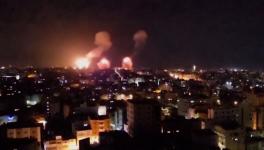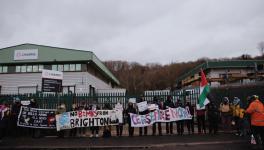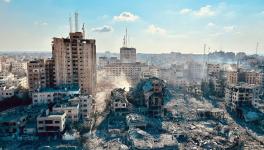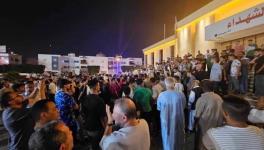Fuel Shortage Due To Israeli Military Blockade Puts Thousands Of Lives At Risk In Gaza
Israel occupation and military blockade in Gaza has led to humanitarian crisis.
An imminent fuel shortage in Gaza could lead to a humanitarian catastrophe for almost two million Palestinians in the besieged Gaza strip, Gaza’s health ministry warned on Saturday. It appealed to the international community for urgent help in order to resolve the crisis and get the necessary fuel delivered, so that hospitals in Gaza, including the children’s facility, have electricity to continue operating.
Ashraf al-Qidra, spokesman of Gaza’s health ministry, said on saturday, “Hundreds of patients at Gaza hospitals will be facing an unknown fate when their electric generators shut down due to the fuel crisis.” He noted that the fuel consumption had increased due to cold weather and the increasingly frequent electricity cuts, which reduced hospitals’ stocks of fuel to 17%. He added that five of Gaza’s hospitals would stop operating within a few hours due to lack of fuel. These include the Al-Nasr hospital for children, the Al-Rantisi hospital for children and the Abu Yusif Al Najjar hospital.
On Thursday, the ministry announced the stopping of services in the Beit Hanoun hospital, resulting in approximately 340,000 people being unable to receive treatment, surgical procedures and laboratory services, along with services in the emergency care department getting adversely affected.
Palestinian human rights group, Al-Mezan, also warned that the fuel shortage will have “dangerous repercussions” for 800 kidney patients on dialysis care as 128 dialysis machines will stop working without electricity. Use of diagnostic devices and scheduling of surgical operations will also be rendered difficult. Close to 45 children are admitted for kidney problems at Al-Rantisi hospital, and more than a hundred other children are being looked after in various nurseries in Gaza.
Close to 35,000 litres of Qatar-funded fuel was delivered to Gaza in October, which significantly improved the electricity situation in Gaza, with Gazans receiving electricity for up to 11 hours per day. But this supply was supposed to last only for six months. The health ministry had warned this week that fuel stocks for the power plant in Gaza, and for running generators, are rapidly decreasing. But for the second week in a row, Israel refused to allow a new instalment of Qatari monetary aid into Gaza. Apart from the fuel crisis, this has resulted in the public sector employees of Gaza, who are on Hamas payroll, not receiving their salaries. Qatar had earlier agreed to pay USD 15 million, over six months, to facilitate the payment of salaries of the public sector workers.
While stressing that all humanitarian as well as other crises in the Gaza strip emanate from the Israeli occupation and blockade, Al-Mezan said that the Palestinian authorities must also work towards improving the situation in terms of fuel management and the healthcare services. In 2017, Palestinian president Mahmoud Abbas had stopped the Palestinian Authority (PA) funding for fuel supplies for the Gaza strip in an attempt to put pressure on Hamas, the bitter rival of Abbas’ Fatah party, which rules over the occupied West Bank. The two Palestinian parties have been involved in a feud since 2007, when Hamas took control of Gaza and expelled the Fatah from the strip. The three subsequent Israeli invasions have wreaked havoc on Gaza’s infrastructure, destroying even the civilian infrastructure which is vital for sustaining normal human life and humanitarian services such as health care, food and medicines.
In another development, the General Federation of Palestinian Trade Unions (PGFTU) recently stated that the poverty rate in Gaza has crossed 80%. PGFTU also raised alarm about the fact that besides the poverty levels, the unemployment rate has also increased to an unprecedented 54.9%, a sign of the rapidly declining economic situation in Gaza. The federation said that the Israeli occupation is responsible for the deterioration of the economy in Gaza, which has forced the people to live and survive in extreme, inhuman conditions.
The federation also called upon the Palestinian authority to lift the sanctions that it has imposed on the Gaza strip as part of its ongoing feud with Hamas so that emergency relief and development projects can be undertaken to provide the much needed relief to workers in Gaza. It also urged Egypt to re-open the Rafah border crossing to allow the entry of essential commodities into Gaza, and appealed to the international community for help in reducing poverty and unemployment levels.
Get the latest reports & analysis with people's perspective on Protests, movements & deep analytical videos, discussions of the current affairs in your Telegram app. Subscribe to NewsClick's Telegram channel & get Real-Time updates on stories, as they get published on our website.
























